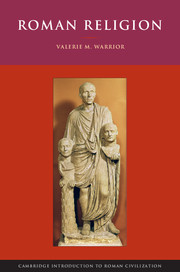Book contents
- Frontmatter
- Contents
- List of Illustrations and Maps
- Preface
- Acknowledgments
- 1 The Gods and their Worship
- 2 Divination, Prayer, and Sacrifice
- 3 Religion and the Family
- 4 Religion and the State
- 5 Religion and War
- 6 The Calendar, Festivals, and Games
- 7 Official Attitudes toward Foreign Cults
- 8 Magic and the Occult
- 9 Becoming a God
- 10 The Jews and Christianity
- Chronology
- Maps
- Gods
- Glossary
- Ancient Sources
- Bibliography
- Illustration Credits
- Index
4 - Religion and the State
Published online by Cambridge University Press: 05 February 2015
- Frontmatter
- Contents
- List of Illustrations and Maps
- Preface
- Acknowledgments
- 1 The Gods and their Worship
- 2 Divination, Prayer, and Sacrifice
- 3 Religion and the Family
- 4 Religion and the State
- 5 Religion and War
- 6 The Calendar, Festivals, and Games
- 7 Official Attitudes toward Foreign Cults
- 8 Magic and the Occult
- 9 Becoming a God
- 10 The Jews and Christianity
- Chronology
- Maps
- Gods
- Glossary
- Ancient Sources
- Bibliography
- Illustration Credits
- Index
Summary
Among the many divinely inspired institutions established by our ancestors, nothing is more outstanding than their desire to have the same individuals in control over worship of the gods and the vital interests of the state. Their objective was to ensure that the most eminent and illustrious citizens maintain religion by their good government of the state, and maintain the state by their wise interpretation of religion.
(Cicero, On His House 1.1)No public business was ever transacted at home or abroad without first taking the auspices.
(Cicero, On Divination 1.3)In public life, the rituals of prayer and sacrifice were led by official priests acting on behalf of the state. Most priests of state religion were male and held office for life, one notable exception being the Vestal Virgins, the priestesses of Vesta. Vestals served full-time, whereas male priests were engaged only part-time in their priestly duties and frequently had active political and military careers. A man who had held a major political office automatically became a member of the Senate, a body that was consulted on both political and religious matters. Thus Cicero (On His House 1.1) notes the wisdom of having the same men controlling the worship of the gods and the vital interests of the state. The tradition of taking the auspices further exemplifies the inextricable relationship between religion and politics: the gods' will had to be sought before any public business was initiated, be it political or military.
- Type
- Chapter
- Information
- Roman Religion , pp. 41 - 54Publisher: Cambridge University PressPrint publication year: 2006



